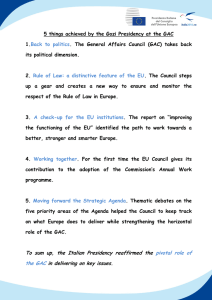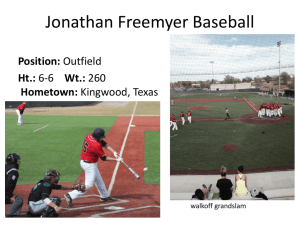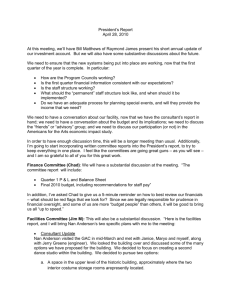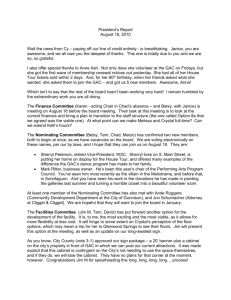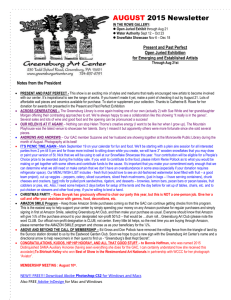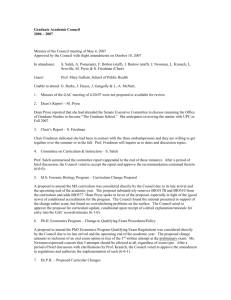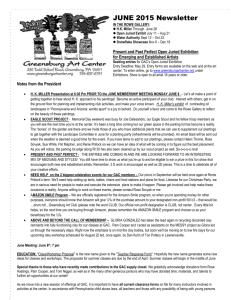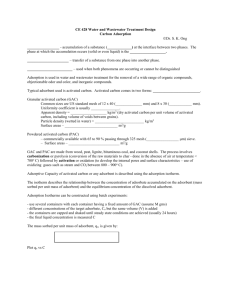ACTION POINT: GAC and ALAC respective secretariats/support staff
advertisement
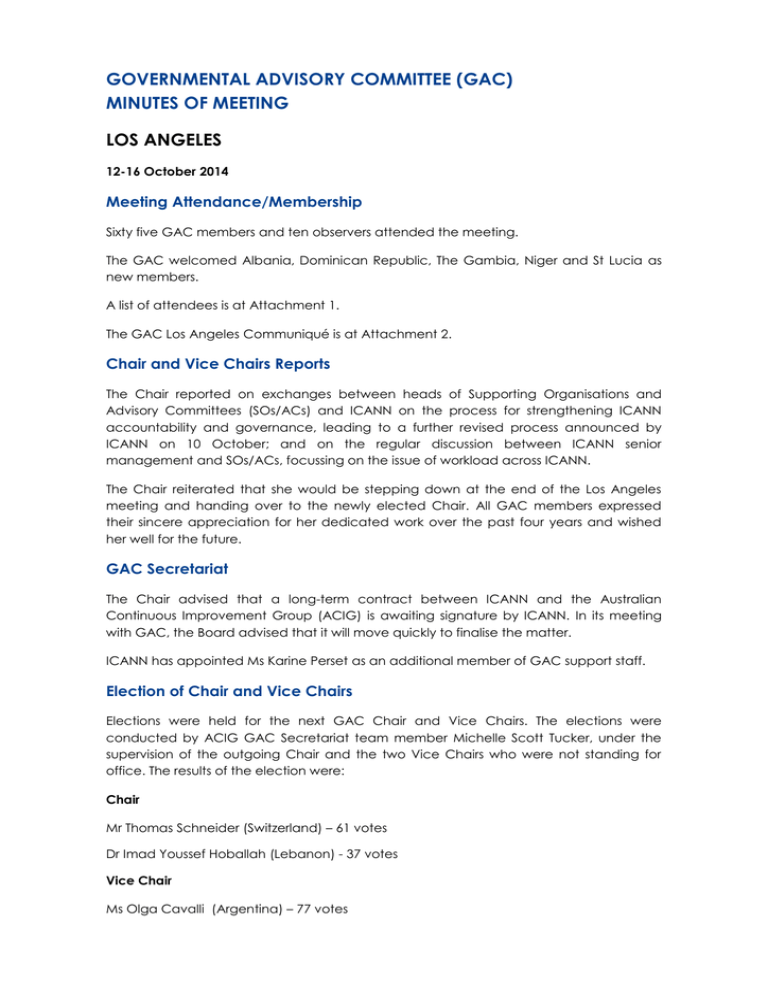
GOVERNMENTAL ADVISORY COMMITTEE (GAC) MINUTES OF MEETING LOS ANGELES 12-16 October 2014 Meeting Attendance/Membership Sixty five GAC members and ten observers attended the meeting. The GAC welcomed Albania, Dominican Republic, The Gambia, Niger and St Lucia as new members. A list of attendees is at Attachment 1. The GAC Los Angeles Communiqué is at Attachment 2. Chair and Vice Chairs Reports The Chair reported on exchanges between heads of Supporting Organisations and Advisory Committees (SOs/ACs) and ICANN on the process for strengthening ICANN accountability and governance, leading to a further revised process announced by ICANN on 10 October; and on the regular discussion between ICANN senior management and SOs/ACs, focussing on the issue of workload across ICANN. The Chair reiterated that she would be stepping down at the end of the Los Angeles meeting and handing over to the newly elected Chair. All GAC members expressed their sincere appreciation for her dedicated work over the past four years and wished her well for the future. GAC Secretariat The Chair advised that a long-term contract between ICANN and the Australian Continuous Improvement Group (ACIG) is awaiting signature by ICANN. In its meeting with GAC, the Board advised that it will move quickly to finalise the matter. ICANN has appointed Ms Karine Perset as an additional member of GAC support staff. Election of Chair and Vice Chairs Elections were held for the next GAC Chair and Vice Chairs. The elections were conducted by ACIG GAC Secretariat team member Michelle Scott Tucker, under the supervision of the outgoing Chair and the two Vice Chairs who were not standing for office. The results of the election were: Chair Mr Thomas Schneider (Switzerland) – 61 votes Dr Imad Youssef Hoballah (Lebanon) - 37 votes Vice Chair Ms Olga Cavalli (Argentina) – 77 votes Mr Henri Kassen (Namibia) – 67 votes Ms Gema Campillos Gonzalez (Spain) – 48 votes Mr Wanawit Ahkuputra (Thailand) - 38 votes Mr Ihsan Durdu (Turkey) – 34 votes Dr Vujica Lazovic (Montenegro) – 11 votes Mr Thomas Schneider was declared elected as Chair. Ms Olga Cavalli, Mr Henri Kassen and Ms Gema Campillos Gonzalez were declared elected as Vice Chairs. The GAC discussed the need for additional Vice Chairs, noting that GAC Operating Principle 21 requires that, to the extent possible, the Vice Chairs should appropriately reflect the geographic and development diversity of the membership. Accordingly, under Operating Principle 23, the GAC designated Mr Wanawit Ahkuputra of Thailand and Mr Ihsan Durdu of Turkey to perform the roles of Vice Chair for the same period as the newly elected Vice Chairs. Review of Certain GAC Operating Principles1 The GAC agreed to review the following GAC Operating Principles in the light of the experience of the most recent round of elections: Principles 21-23 (Chair, Vice Chairs, Other Officers) – including the number of Vice Chairs Principles 31-36 (Election of Chair and Vice Chairs) – including election procedures. There was discussion of Principles 14-18 (Membership and Observers) but no agreement was reached on further action. ACTION POINT: GAC Leadership Group, in conjunction with ACIG Secretariat, to review relevant Operating Principles and report back to the next GAC meeting. MEETING WITH ICANN BOARD The GAC met with the ICANN Board and raised the following issues: Outcome of elections for GAC Chair. IANA Stewardship Transition. Enhancing ICANN Accountability and Governance. Reviews of the current gTLD round and associated issues. Implementation of safeguards for new gTLDS. Workload issues across the ICANN community. Dot SPA. Protection of names and acronyms for IGOs and Red Cross/Red Crescent. The GAC Operating Principles can be found at https://gacweb.icann.org/display/gacweb/GAC+Operating+Principles 1 Proposed ICANN ByLaw changes concerning GAC advice. Two-character domain names at the second level. Finalisation of ACIG/ICANN contract. Specifics of these matters and the Board response are detailed under relevant subject headings elsewhere in these Minutes. INTER-CONSTITUENCY ACTIVITIES GAC-Generic Names Supporting Organisation (GNSO) Consultation Group The GAC met with the GNSO, with most discussion (as in London) around the GAC-GNSO Consultation Group2 that started work in the first quarter of 2014. GAC welcomed the appointment of Mr Mason Cole as GNSO liaison to the GAC as part of a one-year pilot project. The objectives are to facilitate the flow of information between GNSO and GAC; and assist with engagement of GAC in GNSO processes. The survey of GAC members on communication mechanisms had 29 responses. Issues identified included the high volume and frequency of GNSO activities, tight timelines and the specialised nature of much work, making it difficult for government officials to participate. Suggestions for improvement included highlighting specific public policy aspects, more updates on PDP progress and appropriate links on the GAC website. A possible GAC group to implement Consultation Group outcomes, including “triage” (prioritising critical issues) of GAC-relevant items at the GNSO Issues Report stage, was discussed briefly. The GAC agreed to further work as follows: Consultation Group to review input received in Los Angeles (including an open face-to-face meeting on 12 October3); Continued implementation of the GNSO liaison pilot project. Further development of recommendations for GAC and GNSO consideration within the existing two Work Tracks covering mechanisms to enhance day-to-day cooperation and GAC early engagement in PDPs. More detailed information is in the slides used for the session [Link to be inserted]. Progress on protection for IGO names and acronyms was noted (for more information see GAC ADVICE ON NEW gTLDs, page 6). ACTION POINT: Further work to proceed through the GAC-GNSO Consultation Group. Meeting with Country Code Name Supporting Organisation (ccNSO) The GAC met with the ccNSO and discussed two issues. The work of the Group can be accessed at https://community.icann.org/display/gnsogcgogeeipdp/GACGNSO+Consultation+Group+on+GAC+Early+Engagement+in+Policy+Development+Processes+Home 3 Transcript at http://la51.icann.org/en/schedule/sun-gac-gnso-consultation/transcript-gac-gnso-consultation12oct14-en 2 The ccNSO explained the basis for its submission to the public comment process on ICANN Accountability and Governance, noting that all major concerns had been addressed in the most recent revised proposal announced by ICANN. Slides used for this presentation are [link to be inserted]. The final draft report of the Framework of Interpretation Working Group (FOIWG) 4 was also discussed. It recommends definitions/clarifications of key terms to guide IANA in the delegation, transfer and revocation of ccTLD management responsibilities. The report has the unanimous support of ccNSO members. It was noted that these issues will need to be considered as part of the IANA Stewardship Transition. Slides used for this presentation are [link to be inserted]. The ccNSO is seeking a GAC response before the recommendations are submitted to the ICANN Board. Norway will lead the preparation of GAC comments inter-sessionally, with assistance from the United States. ACTION POINT: The GAC (lead: Norway/US) will prepare comments on the FOIWG final draft report as soon as possible and submit to the ccNSO when agreed. Meeting with At-Large Advisory Committee (ALAC) The GAC met with the ALAC and discussed three issues. Firstly, with regard to Public Interest Commitments (PICs), ALAC is seeking a freeze of all Category 1 strings for which safeguards 1-8 apply (including dot university, dot pharmacy etc); and formation of a group to evaluate PICs and recommend improvements. GAC support for these measures would be welcomed by ALAC. Several GAC members considered that there is common ground with ALAC on these matters, noting that the Board’s responses to GAC advice continue to fall short of what GAC is seeking. There is now an additional concern that contracts for registry operation and other functions may have been signed without any apparent way of objectively checking that agreed safeguards are being applied in practice. Secondly, there was an exchange of views on IANA stewardship transition, including at both the ICG and operational community levels. Thirdly, ALAC briefed GAC on outcomes from the ATLAS II summit5 held at the London meeting and implementation arrangements put in place by ALAC. Slides used for this presentation are available at [link to be inserted]. GAC members expressed interest in staying in touch on implementation, and in continuing to identify common concerns such as workload management. ACTION POINT: GAC and ALAC respective secretariats/support staff to liaise on issues of common interest, including ATLAS II implementation, and report to members as appropriate. GAC WORKLOAD & PRIORITISATION These issues were discussed at the GAC’s meeting with the Board and in several other sessions, including on WHOIS and gTLD Safeguards. 4 5 http://ccnso.icann.org/workinggroups/foi-final-07oct14-en.pdf http://www.atlarge.icann.org/announcements/announcement-07aug14-en.htm Members are concerned at workload issues across ICANN and want to work with relevant parties on ways to identify when and where the GAC can best contribute advice and expertise. At the moment it looks like “everything is a priority.” GAC recognises it needs to work with the community on this as GAC tends to respond rather than initiate. Clearer priorities will help to get the best and most timely GAC response. The Board recognised specific issues associated with GAC working methods, although it noted that GAC is not alone in trying to prioritise an increasing amount of work. It was agreed that further consideration be given to this in offline GAC-Board discussions. ACTION POINT: GAC secretariat/support staff to clarify with Board support staff what scope there is for further GAC/Board discussions. IANA STEWARDSHIP TRANSITION & ENHANCING ICANN ACCOUNTABILITY With regard to IANA Stewardship Transition: The GAC nominees to the Community Working Group to develop a proposal on naming related functions (Thailand and Norway) reported on developments. Members stressed the critical link with better ICANN accountability. The GAC met with members of the IANA Stewardship Transition Coordination Group (ICG) and had a useful exchange of information and views. With regard to ICANN Accountability and Governance: GAC noted ICANN’s announcement on 10 October of a revised process including a simplified Community Working Group structure. Members agreed with the proposed approach of two work streams: one for issues linked to the IANA transition proposal, and the other for broader issues. Several members participated in the community sessions held during the ICANN meeting6 that formed the basis for initiating the new Community Working Group on ICANN Accountability. The GAC agreed that at this stage it would be useful to develop high level principles as part of GAC input to both processes. It was agreed to include several such principles in the Communiqué; and to develop further principles inter-sessionally, noting the tight timeframes involved. These matters were raised in the GAC’s meeting with the Board, with most discussion on ICANN accountability and governance. The Board noted that NTIA would not accept an IANA transition proposal without community consensus on accountability related to the transition. Accordingly, the Board will only reject accountability outputs from the community if there is a two-thirds majority, and would pursue discussions with the relevant community until consensus is achieved. The Board advised that next steps on the NetMundial roadmap initiative are still under discussion. ACTION POINTS: GAC principles for both processes to be included in Communiqué. DONE. GAC members and secretariat/support staff to work with nominees to CCWG on 6 On 13 and 16 October. naming related functions. GAC to consider nomination of members to Accountability CCWG Drafting Team and the CCWG in due course. GAC ADVICE ON NEW gTLDs gTLD Safeguards Several GAC members raised concerns about the Board’s most recent response to GAC advice on implementation of new gTLD safeguards. These include lack of clarity on how things will work in practice (for example, no timeline for full implementation); WHOIS, security audits, and validation and verification of credentials; no systematic means of knowing whether safeguards are being embedded in contracts; and possible social problems caused by names acquiring more sensitive meanings over time. An ad hoc group, led by the US and EC, was formed to identify key issues to be included in the communiqué as a response to the latest communication from the ICANN Board. At it’s meeting with the Board, GAC noted that detailed comments on these matters would be included in the communiqué. Consideration of a more detailed Annex as possible supplementary advice will continue inter-sessionally. ACTION POINT: Key concerns to be included in Communiqué. DONE. Possible supplementary advice to be considered inter-sessionally. Specific strings The Belgian GAC representative raised with the Board the issue of competing applications for dot.SPA. Belgium wishes to know what information the geographic names panel used to reach its conclusions; what are the next steps; and how will the community aspects of the applications be taken into account. The Board invited Belgium to put these questions in writing. ACTION POINTS: GAC to monitor relevant developments. Protection of Inter-Governmental Organisation (IGO) Names and Acronyms The GAC reiterated previous concerns about the continuing lengthy delays in finalising appropriate protections for IGO names and acronyms. GAC will continue to participate in the small informal group involving the NGPC and IGOs that is working on possible resolution of differences between GAC and GNSO advice on preventative protection measures. A draft version of one possible approach being discussed within that group was circulated for information. ACTION POINT: GAC to nominate members to the informal group and participate in further discussions towards a resolution. Protection of Red Cross/Red Crescent Names The NGPC advised that it had adopted the following Resolution at its meeting of 12 October 2014: Resolved (2014.10.12.NG05), the President and CEO, or his designee(s), is directed to provide temporary protections for the names of the International Committee of the Red Cross and International Federation of the Red Cross and Red Crescent Societies, and the 189 National Red Cross and Red Crescent Societies, as identified in the GAC Register of Advice as 2014-03-27-RCRC while the GAC, GNSO, Board, and ICANN community continue to actively work on resolving the differences in the advice from the GAC and the GNSO policy recommendations on the scope of protections for the RCRC names. The NGPC has written separately to the Board concerning GAC’s advice that some subjects are not appropriate for a GNSO PDP, suggesting that the Board take advice on this and write to the GAC. GAC members agreed that this is a significant step towards meeting previous GAC advice. The lengthy process, however, does raise issues of international public law and ICANN accountability. ACTION POINT: GAC to await further Board response to its advice on this issue not being appropriate for a GNSO PDP. REVIEWS OF CURRENT ROUND OF NEW gTLDs & PREPARATION FOR SUBSEQUENT ROUNDS GAC was briefed by ICANN staff (Akram Atallah) on plans for reviews of the current gTLD round as preparatory work for possible future rounds, as set out in the recent ICANN document New gTLD Program Reviews and Assessments Draft Work Plan 7. GAC members noted that they still have concerns about implementation issues in the current round, for example, safeguards and community evaluation. Significant new work may create timing and workload problems across the community, particularly if several reviews coincide with a GNSO PDP. Members feel that the current round has shown a major regional imbalance, and that action is needed to ensure that Africa and Latin America have sufficient information and resources to participate in future; and that specific problems for some regions such as over-reliance on the Trade Mark Clearing House are addressed. GAC is also concerned that the Community Evaluation Panel process is making it unnecessarily difficult for communities to gain recognition; and that there appears to be no plan to encourage cultural diversity. GAC has a particular interest in the AoC-mandated review of the impact of new gTLDs on competition, consumer trust and consumer choice. These issues were raised at GAC’s meeting with the Board, who responded that: 7 All timeframes in the ICANN Work Plan document are indicative only. Serious consideration of the next round has not yet started. The competition/consumer review has not really started, but the timing mandated by the AOC means that baseline data studies on economic impacts and consumer awareness have to be commenced now. Timing of any GNSO policy review is up to the GNSO. There is a GNSO Working Group that is “collecting issues” at this point. https://www.icann.org/news/announcement-3-2014-09-22-en ACTION POINT: GAC concerns to be included in Communiqué. DONE. GAC secretariat/support staff to monitor developments and report to GAC. COMMUNITY PRIORITY EVALUATION PROCESS Members noted that there continued to be apparently inconsistent outcomes from Community Evaluation Panels assessing applications for community gTLDs, as reflected in several recent rejections of applications. In the short term, there was support for investigating the feasibility of some type of appeal mechanism from Panel decisions. In the longer term, members believed that the promotion and evaluation of community gTLDs should be fully evaluated in the review process for the current round. ACTION POINT: GAC to request the Board, through the Communiqué, to look into this matter and consider possible appeal mechanisms for the current round. DONE. WHOIS GAC members attended the ICANN community briefing session on “All Things WHOIS”. While welcoming the comprehensive nature of the session, members remained concerned at the piecemeal approach (for example, formation during the meeting of an implementation group on conflicts between national laws and WHOIS requirements). GAC will seek more guidance on areas where GAC input would be most useful and the associated timing and resource implications. GAC noted that the 2007 GAC Principles on WHOIS remain relevant and are an important guide for continuing work. The GAC’s concerns were raised at the meeting with the Board in the context of broader workload and prioritization issues (see under GAC WORKLOAD AND PRIORITISATION). ACTION POINT: GAC to request, via the Communiqué, a road map identifying linkages and timelines across all WHOIS issues. DONE. 2-CHARACTER NAMES & COUNTRY NAMES AT THE SECOND LEVEL GAC discussed a range of requests to ICANN by new gTLD registry operators to use twocharacter labels at the second level of their TLD. These have been made under the Registry Service Evaluation process (RSEP). Members noted that existing use of two-character second level names has not caused any security, stability, technical or competition concerns. It was agreed that whole-ofGAC advice on specific applications is neither necessary nor feasible. However, GAC noted that some governments may be more interested than others in specific applications, and asked that ICANN alert relevant governments about requests as they arise. GAC considered that use of full country and territory names at the second level is a more sensitive issue, and will consider this issue further before replying to the Board’s request for advice on this matter. ACTION POINT: The above points to be reflected in the Communiqué. DONE. HUMAN RIGHTS & APPLICATION OF INTERNATIONAL LAW GAC agreed that the linked issues of human rights and the application of international law to ICANN activities require further consideration, particularly in the context of followup to NetMundial; and with regard to future new gTLD rounds, including encouraging diversity and protecting vulnerable groups. Peru explained their circulated proposal for amendment of the ICANN ByLaws, submitting that ICANN cannot be detached form international standards, conventions, and case law. GAC agreed to consider all of these issues further inter-sessionally, including obtaining legal opinion if appropriate, and considering ways of working with the community as these matters are of concern beyond just the GAC.8 ACTION POINT: Above points to be reflected in the Communiqué. DONE. ACIG GAC Secretariat to prepare briefing (for GAC Leadership Group in first instance) identifying associated work in other parts of the community and drafting a request for legal opinion. ACCOUNTABILITY AND TRANSPARENCY (BGRI) The GAC was briefed by the Board-GAC Recommendations Implementation Working Group (BGRI-WG) and dealt with outstanding recommendations from the ATRT2 Final report as follows: Recommendation 6.4 (Development of a formal process for the Board to notify and request GAC advice – GAC agreed that BGRI continue to seek comments on current processes and options for improvement. Recommendation 6.5 (ByLaw changes) – GAC noted that public comments on this had been almost unanimously negative, although many of these seemed to be based on a misunderstanding of the purpose and timing of the proposal. At its meeting with GAC, the Board advised that the issue would be out on hold and revisited in the future in the broader context of other changes across the ICANN community. Recommendation 6.7 (GAC to convene a High Level Meeting on regular basis) - GAC agreed that BGRI continue to seek comments on draft guidelines for GAC High Level Governmental Meetings. ACTION POINT: The above outcomes to be reflected in the Communiqué. DONE. BOARD WORKING GROUP ON NOMCOM The GAC was briefed by the Chair of the Board Working Group on the Nominating Committee (NomCom) on their recent report that proposed up to three GAC voting members of the NomCom. The report is open for public comment until 30 November and several members indicated they will be submitting comments. Members noted that the NomCom’s strict confidentiality rules had previously prevented any GAC liaison from consulting with the GAC membership. Erika Mann, a Board member, has undertaken to prepare a paper on protection of rights with ICANN staff assistance (see transcript of Public Forum, 16 October); and there was an extensive exchange between the Board and Non-Commercial Stakeholders (see transcript 14 October). 8 ACTION POINT: An ad hoc working group was formed (Lead: Argentina) to consider this matter inter-sessionally. GAC WORKING GROUPS Future Rounds of New gTLDs (Lead: Australia) The geographic names sub-group of this working group has been active in preparing an issues paper on protection of geographic names in future gTLD rounds, seeking community input and convening a community information session at this meeting. The deadline for community input via the GAC website was extended until 31 October 2014. It was noted that the other streams of work in the group (developing countries and communities) had not yet progressed significantly. ACTION POINT: See PROTECTION OF GEOGRAPHIC NAMES IN gTLDs (page 11) GAC Working Methods (Lead: Spain) The Working Group noted the circulated report from the ACIG GAC Secretariat on implementation of measures agreed at the London meeting. The following issues remain for consideration by the group: Open and closed GAC sessions. Leadership role of Chair and Vice Chairs. Number of Vice Chairs. Decision-making procedure in GAC. ACTION POINT: Working Group to lead on amending Operating Principles as necessary and to progress outstanding issues with support from the ACIG GAC secretariat as necessary. Engagement with Governments and IGOs (Lead: Lebanon) A joint session was held with the ICANN Global Stakeholder Engagement (GSE) Team to progress implementation of ATRT2 Recommendations 6.8 and 6.9. The following proposals will be considered further by both GAC and the GSE team and implemented subject to the procedures of both organisations: An expanded monthly report from GSE to GAC. Regular conference calls between the GAC leadership group and GSE. Regular conference calls between Regional Vice President teams and Regional GAC members. Advance notice to GAC representatives of meetings involving ICANN representatives in their country. Reports from GSE to GAC on outcomes of meetings in GAC member countries. Development of guidelines for regional engagement. Circulate reports from GSE team on plans/engagements/next steps. Have GSE representatives attending open sessions of GAC meetings as a matter of course. ACTION POINT: GSE Team and GAC secretariat/support staff to work on implementation of agreed measures and report back to their respective organisations. PROTECTION OF GEOGRAPHIC NAMES IN gTLDs The GAC again conducted (as at the London meeting) an information session for the community on protection of geographic names in future new gTLD application rounds. This was led by the sub-group on geographic names of the working group on future gTLD issues. The deadline for community submissions to the process was extended to 31 October 2014. Slides from this session are available at [insert link here]. Argentina attended the CCWG on Country Names and reported on linkages with the GAC geographic names work. GAC agreed that there should be greater interaction between the two groups. ACTION POINT: The sub-group to continue its work and seek further input from relevant stakeholders. GAC OPEN FORUM The GAC again conducted (as at the London meeting) an open forum for the community to explain how the GAC operates and seek feedback. It was noted that some community members used the forum to ask questions on substantive GAC positions. GAC decided not to hold another session at the next meeting, but instead take stock and consider the best means of achieving face-to-face community interaction. ACTION POINT: Discussion of this issue to be on the agenda for the next GAC meeting (Lead: Sweden). PLANNING SESSION The GAC concluded with a planning and general wrap-up session. Substantive issues discussed are covered under relevant subject headings above. Procedural issues will be considered further inter-sessionally, through the regular conference calls of the GAC leadership group and discussion through the GAC mail list. ATTACHMENT 1 LIST OF GAC ATTENDEES: LOS ANGELES 12-16 OCTOBER 2014 Members African Union Commission Argentina Australia Austria Belgium Brazil Burkina Faso Cameroon Canada Chile China Chinese Taipei Colombia Commonwealth of Dominica Mali Mongolia Namibia Nauru Netherlands New Zealand Nigeria Niue Norway Paraguay Peru Portugal Qatar Denmark Egypt Estonia European Commission France The Gambia Germany Greece Grenada Holy See –Vatican City State Indonesia Iran Israel Italy Jamaica Japan Kenya Korea, Republic of Latvia Lebanon Romania Russian Federation Rwanda Sao Tome and Principe Senegal Serbia Singapore Spain Sweden Switzerland Thailand Trinidad and Tobago Turkey Ukraine United Arab Emirates United Kingdom United States Uruguay Viet Nam Observers World Intellectual Property Organisation (WIPO) Organisation Internationale de la Francophonie (OIF) Commonwealth Telecommunications Organisation (CTO) International Red Cross Red Crescent World Bank The Organization for Islamic Cooperation (OIC) Organisation for Economic Cooperation and Development (OECD) Caribbean Telecommunications Union (CTU) Interpol New Partnership for Africa’s Development ATTACHMENT 2 GAC LOS ANGELES COMMUNIQUÉ Los Angeles, 15 October 2014 GAC Communiqué – Los Angeles, CA, USA 9 I. Introduction The Governmental Advisory Committee (GAC) of the Internet Corporation for Assigned Names and Numbers (ICANN) met in Los Angeles, CA, USA during the week of the 11th of October. 63 GAC Members attended the meeting and 10 Observers. II. Inter-constituencies Activities 1. Meeting with Generic Names Supporting Organisation (GNSO) The GAC welcomed the appointment of Mr Mason Cole as GNSO liaison to the GAC as part of a pilot project initiated through the GAC-GNSO Consultation Group. The GAC received an update on the Group’s work and the Group will proceed to agree mechanisms for the GAC’s early engagement in GNSO policy development processes. The GAC and the GNSO also exchanged views on the latest developments with regard to protection of Intergovernmental Organisation Names and Acronyms; and IANA Stewardship Transition processes. 2. Meeting with Country Code Names Organisation (ccNSO) The GAC met with the ccNSO and was briefed on the recent report issued by the Framework of Interpretation Working Group. The implications of the report’s recommendations for public policy will be considered by the GAC inter-sessionally. The GAC and the ccNSO also exchanged views on current developments with regard to ICANN accountability and governance. 3. Meeting with At-Large Advisory Committee (ALAC) The GAC met with the ALAC and exchanged views on a range of issues, including IANA Stewardship Transition, ICANN Accountability and outcomes from the ATLAS II At-Large Summit. The GAC and the ALAC exchanged views on their shared serious concerns about the implementation of public interest commitments for the highly regulated sector new gTLDs. III. Internal Matters 1. Elections for Chair and Vice-Chairs Mr Thomas Schneider of Switzerland was elected as the new Chair of the GAC. The GAC expressed its sincere appreciation to Ms Heather Dryden, the outgoing Chair, for her To access previous GAC advice, whether on the same or other topics, past GAC communiqués are available at: https://gacweb.icann.org/display/gacweb/GAC+Recent+Meetings and older GAC communiqués are available at: https://gacweb.icann.org/display/gacweb/GAC+Meetings+Archive. 9 dedicated work in that position since 2010 and wishes her the best in future endeavours. The GAC elected new Vice-Chairs as follows: Ms Olga Cavalli (Argentina); Mr Henri Kassen (Namibia); and Ms Gema Campillos Gonzalez (Spain). Designation of Officers Mr Wanawit Ahkuputra of Thailand and Mr Ihsan Durdu of Turkey were designated to perform the roles of Vice-Chair for the same period as the newly elected Vice-Chairs. 2. New Members The GAC welcomes Albania, Dominican Republic, The Gambia, Niger and St Lucia as new Members. 3. Working Group on Government and Intergovernmental Organisation Engagement The Working Group held a joint briefing session for the GAC in conjunction with staff from ICANN’s Global Stakeholder Engagement team. Several areas of further cooperation and coordination were identified to enable ICANN’s regional representatives and GAC members to inform and assist each other, and for enhanced information exchange at senior levels. 4. GAC Secretariat The existing contract to secure GAC secretariat services from the Australian Continuous Improvement Group (ACIG) concludes on 7 November 2014. The GAC noted with concern that the long-term contract is yet to be finalised, and urges the ICANN Board to ensure this matter is promptly concluded. *** The GAC warmly thanks all of the SOs/ACs who jointly met with the GAC, as well as all those among the ICANN community who have contributed to the dialogue with the GAC in Los Angeles. IV. GAC Advice to the ICANN Board10 1. Transition of US Stewardship of IANA and Strengthening ICANN Accountability The GAC met with members of the IANA Stewardship Transition Coordination Group (ICG) and was briefed on the transition proposal process in relation to names, numbers and protocol parameters. a. The GAC advises the ICANN Board that: i. The GAC and its Members will be working actively through the Cross Community Working Groups established on: a. Development of an IANA stewardship transition proposal on naming related functions; and 10 To track the history and progress of GAC Advice to the Board, please visit the GAC Advice Online Register available at: https://gacweb.icann.org/display/GACADV/GAC+Register+of+Advice b. ICANN accountability and governance. GAC notes that key operational details for the ICANN accountability and governance work stream are still being developed in the community. ii. The IANA transition process should be guided by consensus based decisions and serve the public interest with clearly implementable, transparent and verifiable accountability mechanisms that satisfy requirements of all affected stakeholders. iii. The concept of public interest should be seen as encompassing the larger interest of the different communities affected by Internet Governance processes and not be limited to the interests and objectives of any group or set of stakeholders. iv. It is crucial to make sure accountability processes are guided by the necessary public policy considerations in addition to a technical perspective. It is crucial to make sure these processes are structured in a way that all stakeholders are involved – including governments – in order to ensure that the final outcome of the exercise is also considered legitimate by all participants. 2. Safeguard Advice Applicable to all new gTLDs and Category 1 (consumer protection, sensitive strings and regulated markets) and Category 2 (restricted registration policies) strings The GAC remains concerned that the NGPC has not adopted certain specific GAC proposals on safeguards applicable to new gTLDs set forth in the London Communiqué. In its September 2, 2014 response to the GAC’s advice and questions regarding implementation of the safeguards, the NGPC appeared to accept GAC advice and respond to the GAC’s questions. In substance, however, the NGPC’s response clearly indicates the NGPC believes certain elements of the GAC’s advice would be challenging to implement. Moreover, the NGPC has deferred a concrete response on many key aspects of the implementation of the GAC advice. The GAC raised vital consumer protection issues in the Beijing, Singapore, and, most recently, London Communiqués, which help establish an environment of trust for these new domains as they are delegated. It is urgent to address these issues now because contracts for many new gTLDs have already been signed. Accordingly, a. The GAC strongly advises the ICANN Board to focus its attention on the following: i. Implementation of WHOIS Related-Safeguards 1. Provide the GAC with a comprehensive scorecard indicating steps and timelines regarding all streams of work related to the WHOIS accuracy safeguard; 2. Complete the Pilot study on WHOIS accuracy, including assessment of identity validation, and share the findings in a timely manner for review at the ICANN 52 meeting; 3. Initiate steps towards Phase 3 (identity verification) of WHOIS, including undertaking a cost-benefit analysis of implementation options; and 4. Commit to defining the process to address and resolve inaccurate WHOIS records and respond to non-compliance reports. ii. Security Risks 1. Inform the GAC and provide GAC members an opportunity to contribute inter-sessionally about the ongoing consultation on the framework for Registries to respond to security risks; 2. Inform the GAC of the findings of this consultation no later than three weeks before the ICANN 52 meeting; and 3. Ensure an interim mechanism is in place to effectively respond to security risks. iii. Public Interest Commitment Dispute Resolution Process 1. Modify the dispute resolution process to ensure that non-compliance is effectively and promptly addressed, in particular for cases requiring urgent action. iv. Verification and Validation of Credentials for Category 1 Strings Associated with Market Sectors with Clear and/or Regulated Entry Requirements 1. Reconsider the NGPC’s determination not to require the verification and validation of credentials of registrants for the highly regulated Category 1 new gTLDs. The GAC believes that for the limited number of strings in highly regulated market sectors, the potential burdens are justified by the benefits to consumers; reconsider the requirement to consult with relevant authorities in case of doubt about the authenticity of credentials; and reconsider the requirement to conduct periodic post-registration checks to ensure that Registrants continue to possess valid credentials; and 2. Ensure the issues (verification/ validation; postregistration checks; consultation with authorities) are addressed in the review process for any subsequent rounds of new gTLDs. v. Category 2 Safeguards: Ensuring Non-Descriminatory Registration Policies 1. Amend the PIC specification requirement for Category 2 new gTLDs to include a nondiscriminatory requirement to provide registrants an avenue to seek redress for discriminatory policies. 3. Reviews of First Round of New gTLDs and Preparation for Subsequent Rounds The GAC was briefed by ICANN staff on the recently released New gTLD Program Reviews and Assessments Draft Work Plan, and discussed the issues with the ICANN Board: a. The GAC advises the ICANN Board that: i. The review processes should be conducted and finalised before policy for the further gTLD rounds is developed and should include community-wide engagement on the issues of communication to and access by developing countries and regions, and all aspects of the framework for community-based gTLDs. ii. Appropriate and realistic timeframes should be applied to the review processes to ensure that all lessons of the most recent round are captured, and to avoid further stressing the capacity of both ICANN and the community to do the necessary work. 4. Community Priority Evaluation Process The GAC has concerns about the consistency of the Community Priority Evaluation Process, following the rejection of a number of applications. There is a need to ensure that criteria for community priority treatment are applied consistently across the various applications. a. The GAC requests the ICANN Board: i. To look into this matter and urges the Board to examine the feasibility of implementing an appeal mechanism in the current round in case an applicant contests the decision of a community priority evaluation panel 5. Protection of Inter-Governmental Organisation (IGO) Names and Acronyms a. The GAC reaffirms its advice from the Toronto, Beijing, Durban, Buenos Aires, Singapore and London Communiqués regarding protection of IGO names and acronyms at the top and second levels, as implementation of such protection is in the public interest given that IGOs, as created by governments under international law, are objectively different right holders; namely, i. Concerning preventative protection at the second level, the GAC reminds the ICANN Board that notice of a match to an IGO name or acronym to prospective registrants, as well as to the concerned IGO, should apply in perpetuity for the concerned name and acronym in two languages, and at no cost to IGOs; ii. Concerning curative protection at the second level, and noting the ongoing GNSO PDP on access to curative Rights Protection Mechanisms, the GAC reminds the ICANN Board that any such mechanism should be at no or nominal cost to IGOs; and further, in implementing any such curative mechanism, b. The GAC advises the ICANN Board: i. That the UDRP should not be amended; welcomes the NGPC's continued assurance that interim protections remain in place pending the resolution of discussions concerning preventative protection of IGO names and acronyms; and supports continued dialogue between the GAC (including IGOs), the ICANN Board (NGPC) and the GNSO to develop concrete solutions to implement longstanding GAC advice. 6. Protection of Red Cross/Red Crescent Names The GAC welcomes the decision of the New gTLD Program Committee (Resolution 2014.10.12.NG05) to provide temporary protections for the names of the International Committee of the Red Cross and International Federation of Red Cross and Red Crescent Societies, and the 189 National Red Cross and Red Crescent Societies. The GAC requests the ICANN Board and all relevant parties to work quickly to resolve the longer term issues still outstanding. 7. WHOIS The GAC notes that there are a wide range of WHOIS-related issues that have significant workload implications for both the GAC and the wider community. This includes: Accuracy: Findings and Methodology from the Pilot Accuracy Report. Conflicts with National Privacy Laws. Privacy/Proxy Accreditation issues. Implementation of Thick WHOIS. GNSO PDP Working Group on Translation and Transliteration of Contact Information Implementation of 2013 RAA requirements and the new gTLD Program. Next steps for gTLD Directory Services Expert Working Group Report. The GAC requests a Road Map that identifies linkages and timelines between and among the above issues, in order to enable the GAC to collaborate with other parties to prioritize such work and rationalize timelines and deadlines. 8. Release of 2-Character Names at the Second Level The GAC notes that new gTLD registry operators have submitted RSEP (Registry Service Evaluation Process) requests to ICANN in order to use two-character labels at the second level of their TLD. The GAC recognized that two-character second level domain names are in wide use across existing TLDs, and have not been the cause of any security, stability, technical or competition concerns. The GAC is not in a position to offer consensus advice on the use of two-character second level domains names in new gTLD registry operations, including those combinations of letters that are also on the ISO 3166-1 alpha 2 list. In considering these RSEP requests, and consistent with the Applicant Guidebook, the GAC considers that the public comment period is an important transparency mechanism, and in addition asks that relevant governments be alerted by ICANN about these requests as they arise. The GAC will review the use of country and territory names at the second level and advise the ICANN Board in due course. 9. Human Rights, International Law and ICANN The GAC continued its discussions from the London meeting concerning possible application of human rights and international law to ICANN activities. The GAC will work inter-sessionally to assess a range of issues including legal considerations and the possible role of human rights considerations. 10. Accountability and Transparency The GAC was briefed by the Board-GAC Recommendation Implementation Working Group (BGRI-WG) and agreed to specific ATRT2 Recommendations being progressed as follows: a. Development of a formal process for the Board to notify and request GAC advice (Recommendation 6.4) – Continue to seek comments on current processes and options for improvement, b. Bylaw changes to formally implement the documented process for Board-GAC Bylaws consultation developed by the BGRI-WG (Recommendation 6.5) – In its meeting with the ICANN Board, the GAC was advised that this will not proceed in its current from and will be subject to further consideration. c. The GAC to convene a High Level Meeting on a regular basis (Recommendation 6.7) – Continue to seek comments on guidelines for GAC High Level Governmental Meetings The GAC also discussed the role of the GAC in the Nominating Committee in light of recommendations made by the recent report of the Board Working Group on Nominating Committee (NomCom). The GAC will continue consideration of this issue inter-sessionally with the aim of providing advice at the ICANN 52 meeting. 11. Protection of Geographic Names in gTLDs The GAC again convened a community session, led by the sub-group on geographic names of the working group on future gTLD issues, on protection of geographic names in future new gTLD application rounds. Community input is being sought, via the GAC website, until 31 October 2014. The GAC looks forward to working with the community on ways to coordinate efforts on this issue, including a community session to be held during the ICANN 52 meeting. 12. GAC Open Forum The GAC convened an open session for the community to inform about and exchange views on the GAC and its working methods, in accordance with Recommendation 6.1.a of the ATRT2 Report. Similar sessions were held at the London meeting and at the Internet Governance Forum in Istanbul. V. Next Meeting The GAC will meet during the period of the 52 Morocco. nd ICANN meeting in Marrakech,
